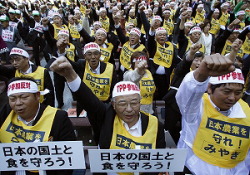Japan to decide to join trade talks despite fears in farm sector

Mainichi Japan | November 10, 2011
Japan to decide to join trade talks despite fears in farm sector
TOKYO (Kyodo) — The Japanese government is expected to decide on Thursday to join negotiations for a Pacific free trade agreement to boost the country’s sluggish economy, overcoming resistance within the ruling party and the farm industry that fear an adverse impact from the U.S.-backed tariff-cutting pact.
Prime Minister Yoshihiko Noda, who is set to announce his intent to participate in the Trans-Pacific Partnership talks later in the day, said that the government’s basic stance is to seek a balance between high-level free trade pacts and revitalization of the country’s faltering farm industry.
Japan’s decision would come just before leaders of the Pacific Rim economies gather for a two-day summit meeting in Hawaii from Saturday. The TPP negotiating members are expected to meet on the sidelines and possibly agree on a broad framework for the initiative.
While Noda has expressed a desire for Japan to take part in the talks since taking office in September, the issue has divided not only public opinion but also lawmakers of the ruling Democratic Party of Japan.
Reflecting the sensitivity of the issue, a DPJ task force decided late Wednesday to urge the government to make a decision in "a cautious manner," but stopped short of giving a clear-cut proposal on whether or not the country should join the talks.
In expressing his desire for Japan to take part in the talks, Noda has stressed the need to promote free trade agreements to boost the domestic economy by taking advantage of growth in the Asia-Pacific region.
Chief Cabinet Secretary Osamu Fujimura separately told a press conference that joining the talks would allow Japan to get involved in the rule-making process of the TPP, which may eventually evolve into an agreement that covers a wide part of the Asia-Pacific region.
But he also acknowledged the need to support the farm sector, apparently in consideration of the negative impact it may face as a result of tariff cuts.
The TPP negotiating countries are seeking to forge a high-level free trade agreement that in principle will require members to scrap all tariffs. This may make it difficult for Japan to set exceptions for items such as rice and dairy products as it has done in past bilateral FTAs with other countries.
Concerns over how the TPP would affect the country have also spread beyond the farm industry as the agreement is intended to cover rules on investment and services liberalization.
The business community, meanwhile, is supportive of the TPP as the agreement would likely help increase exports by Japan’s auto and electrical machinery makers.
The TPP originated in a free trade undertaking among Brunei, Chile, New Zealand and Singapore, and negotiations are under way to expand the framework by including five other Asia-Pacific countries, such as major agricultural exporters the United States and Australia.
The Japanese government initially hoped to decide by June on whether to join the talks, but the momentum temporarily fizzled out in the wake of the devastating March 11 earthquake and tsunami, which also triggered a nuclear crisis at the Fukushima Daiichi power plant.
The upcoming summit of the Asia-Pacific Economic Cooperation forum in Hawaii is expected to provide an opportunity for Noda to convey Japan’s decision on the issue to U.S. President Barack Obama and other leaders involved in the TPP talks.





